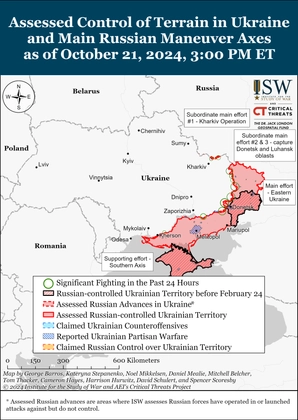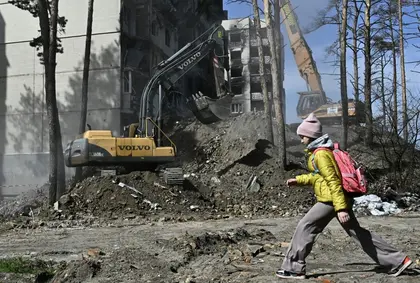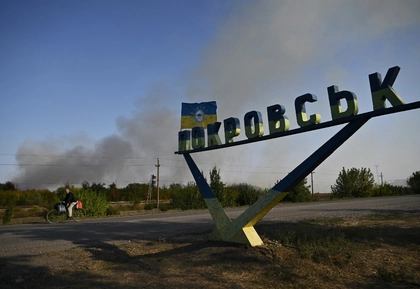On Sept. 5, GLOBSEC published the report “Scars on Their Souls: PTSD and Veterans of Ukraine
The report provides policy recommendations on establishing a viable and efficient integral eco-system for tackling post-traumatic stress disorder (PTSD) and other war trauma mental disbalance (WTMD) in veterans of Ukraine. Equally important, it gives insight into the long-term challenges all of Ukraine – the government, society, families, and individuals – will be facing in the years to come. It also provides the international community with a better understanding of the human costs and lifelong consequences of a modern, full-scale, and high-intensity war.
JOIN US ON TELEGRAM
Follow our coverage of the war on the @Kyivpost_official.
Moreover, the report provides further insight into the long-term effects of Russian atrocities, war crimes and crimes against humanity.
Warfare in Ukraine is unprecedented
In this conflict ordinary people have had to leave behind lives they once knew. As such, they are much more vulnerable to the exposure of war than professionally trained servicemen that the US and UK deploy for their military missions.
The majority of the population lives under constant threat, with a considerable part of the country occupied by Russian forces: many have experienced the worst atrocities of war, exposed to barbaric torture and forceful Russification. These circumstances leave Ukrainians particularly exposed to war-related traumas and to develop an array of WTMD issues, including PTSD at an unprecedented scale, according to the GLOBSEC report.

ISW Russian Offensive Campaign Assessment, October, 22, 2024
The war began in 2014. According to the Ministry of Veteran Affairs of Ukraine (MVAU), Ukraine had 851,068 veterans even before the full-scale war started on Feb. 24, 2022. Of these, 305,453 were veterans of 8 years of defending the country against Russian aggression in parts of Donbas and in the Black Sea (2014-22).
Some of the veterans are – somewhat ironically – a consequence of Ukraine’s extensive support to NATO and UN operations globally. Ukraine was for years the biggest non-NATO member contributor to NATO-led international operations.
If the war was to end today, Ukraine would have around 1.8 million veterans from the full-scale war. If their families are included (spouse and two children) – who are likely to develop secondary symptoms of WTMD – a staggering 7.2 million Ukrainian citizens (or 10-20 percent of the total population) might need psychological support and care because of trauma caused by the war alone.
The real numbers, however, could be much higher.
For 20 months, Ukrainians have been living under constant threat of missile and UAV attacks. Since Feb. 24 last year, there have been 26,304 air alerts in Ukraine. In Kyiv alone, there have been 881 alarms since Feb. 24, lasting for a total of 40 days, or 980 hours.
Additionally, cities and settlements close to the frontline are exposed to attacks daily – 20-25 airstrikes, 40-70 MLRS and 80-150 artillery attacks. Some cities and settlements have ceased to exist.
The human costs are massive. OHCHR has recorded “only” 27,449 civilian casualties so far, it believes that the actual figures are considerably higher.
The international community lacks information about the situation in occupied cities and settlements. It acknowledges, however, the massive destruction across Ukraine, Russia’s indiscriminate attacks, its crimes against humanity and its process of cleansing the areas of pro-Ukrainian individuals.
There are great concerns about the situation in Mariupol, Lysychansk, Popasna, and Severodonetsk where there are allegations of numerous civilian casualties. The city of Mariupol alone is believed to have suffered 100,000 – 113,000 killed.
I fear that as many as 170-200,000 civilians might have been killed altogether. According to The New York Times, the Ukrainian security and defense sector might have suffered an additional 70,000 soldiers killed and 10,000-120,000 wounded. It is assessed that between 20,000-50,000 Ukrainians have lost one or more limbs since the start of the war.
There are more than 6.2 million refugees and 5.1 million internally displaced persons. Approximately 17.6 million people – a staggering 49 percent of the current population – now need humanitarian assistance and protection. Additionally, more than 4 million have been forcibly displaced to Russia. Ukraine’s demography has undergone dramatic changes due to Russian aggression.
As the report points out, war-related traumas are not related to soldiers only. All that have been exposed to the violence of war, are at risk of cumulative psychological trauma, which could be more difficult to treat with the length of time
The war in Ukraine has also caused unprecedented challenges with the displacement of healthcare professionals and the destruction of medical facilities across the country. A Health Needs Assessment (HNA) conducted by WHO (2022), found that one in every three members of the population in Ukraine had difficulty accessing medical treatment.
According to the Ministry of Health of Ukraine (MHU), some 15 million will require different kinds of psychological support. Around 3-4 million people will need medication to manage mental health problems resulting from the war.
Many of the refugees who have sought protection abroad have lived through personal post-traumatic events related to sudden evacuations and journeys to unknown destinations. Many have suffered horrors of the war before and were under real threats to their lives before crossing over the border.
However, living in safety abroad while relatives remain in Ukraine daily attacked by the aggressor, combined with the challenges related to adapting to a new environment abroad also leaves them exposed to developing complex post-traumatic stress disorder (CPTSD) and other fragile psychological conditions caused by war traumas.
The humanitarian costs of the war are overwhelming and will have a lasting impact.
The scale and scope of the war-related psychological traumas Ukraine is presently facing is already daunting. Ukraine would need extensive support to be able to provide professional help to 10 to 20 percent of its population.
What to do
The longer the war lasts, the greater the repercussions.
The problem is that there are no signs of the war ending anytime soon. The West still lacks the will to intervene militarily. This is, however, the only alternative that would fundamentally change the military balance in a manner that might end the war.
Ukraine cannot stop fighting. If it does, Ukraine will cease to exist.
Unfortunately, Russia find itself unable to stop its war of aggression. Notwithstanding their belief that victory is still within reach, Russia cannot achieve Great Power status and parity with the US and China without controlling Belarus and Ukraine. The full-scale invasion has turned into a “now-or-never” moment for Russia.
Only a military intervention by the West will provide Putin the offramp he would need for him to withdraw Russian forces from Ukraine.
He would be able to sell the message of Russia stepping back to reduce the risks of a nuclear confrontation while arguing that he had reached his “aims” for the so-called “special military operation.”
The extensive and far-reaching consequences of war-related physical and psychological traumas add yet another argument for the West to act more resolutely.
Fear does not legitimate inaction at a time when resolute actions are needed. The West must demonstrate that it accepts the costs of re-establishing and upholding peace.
NATO has the means to intervene and stop the war. It only needs to find the courage to step forward and do what it was conceptually meant to do.
The views expressed in this opinion article are the author’s and not necessarily those of Kyiv Post.
Hans Petter Midttun, Independent Analyst, Hybrid Warfare, Non-resident Fellow at Centre for Defence Strategies, board member Ukrainian Institute for Security and Law of the Sea, former Defence Attaché of Norway to Ukraine, and Officer (R) of the Norwegian Armed Forces.
You can also highlight the text and press Ctrl + Enter






